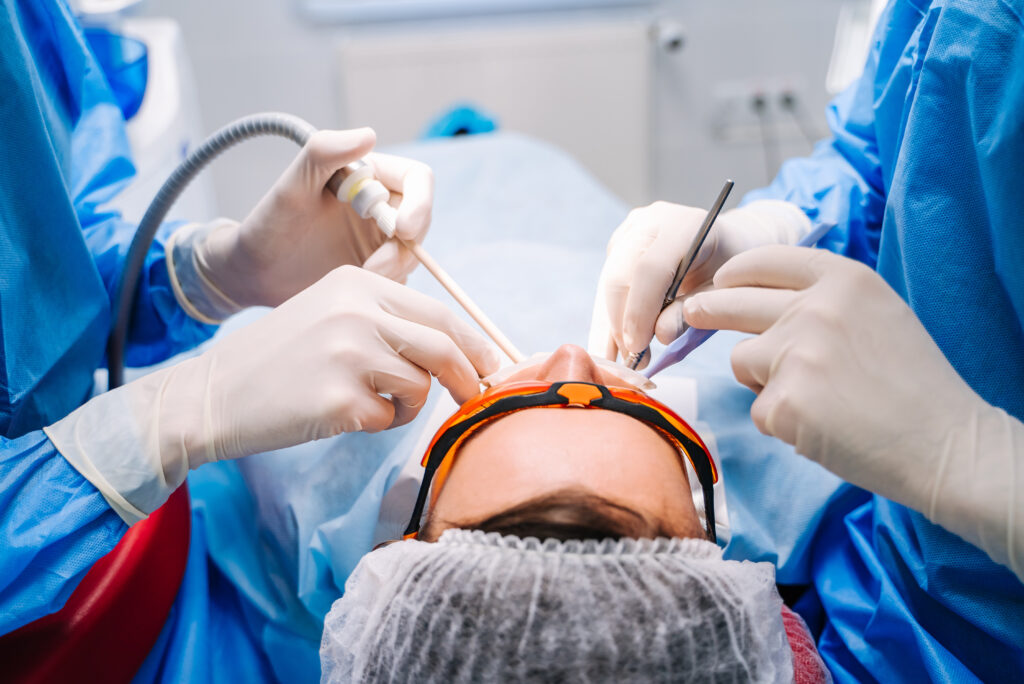(801) 212-9061
7555 Center View Ct Suite 104 West Jordan, UT 84084
Periodontal Surgery in West Jordan

Periodontal surgery involves a range of procedures designed to treat periodontal disease, a condition that affects the gums and the supporting structures of the teeth. It’s often considered when non-surgical treatments are not enough to halt the progression of periodontal disease.
If you or your loved one need periodontal surgery contact us today to schedule an appointment at (801) 212-9061.
Periodontal Surgery: Procedures and Outcomes
Periodontal surgery becomes necessary when periodontal pockets, the spaces between the gums and teeth, become too deep to clean effectively with brushing, flossing, and professional cleaning. The collection of bacteria in these pockets can lead to severe infection, bone loss, and, ultimately, tooth loss.
Types of Periodontal Surgeries
- Flap Surgery (Pocket Reduction Surgery): The gums are lifted back, and the tartar is removed from deeper pockets. The gums are then placed snugly around the tooth to reduce the size of the pockets.
- Gum Grafts: Used to cover roots or develop gum tissue where it has receded excessively, thus preventing further recession and bone loss.
- Bone Grafting: Involves using fragments of the patient’s own bone, synthetic bone, or donated bone to replace and regenerate lost bone around the teeth. This is often critical for maintaining tooth stability.
- Guided Tissue Regeneration: This procedure encourages the regrowth of bone destroyed by bacteria, using a small piece of biocompatible fabric placed between the bone and tooth.
- Tissue-stimulating Proteins: A technique that involves applying a special gel to a diseased tooth root. This gel contains proteins found in developing tooth enamel and stimulates healthy bone and tissue growth.
Post-Surgical Care and Recovery
The success of periodontal surgery is greatly influenced by post-operative care. Patients may be prescribed medications to manage pain and prevent infection. Follow-up appointments are important to monitor healing and make sure the surgery is a success. Additionally, maintaining good oral hygiene and quitting smoking are critical to prevent the recurrence of periodontal disease.

Common Misconceptions about Periodontal Surgery
Misconception: Periodontal Surgery is Extremely Painful
Fact: With modern medicine and sedation techniques, periodontal surgery is more comfortable than ever, and post-operative discomfort can be effectively managed with medications.
Misconception: Surgery Will Solve Periodontal Disease Permanently
Fact: While surgery is pivotal in managing periodontal disease, ongoing maintenance, including regular cleanings and good oral hygiene practices, are essential to prevent recurrence.
Misconception: Periodontal Surgery is Only for Severe Cases
Fact: Surgery may be recommended in various stages of periodontal disease, depending on the specific condition and response to other treatments.
Periodontal surgery is an important step in combating periodontal disease, preserving natural teeth, and enhancing overall oral health.
If you are experiencing symptoms of periodontal disease, or if it’s time for your regular dental check-up contact us at (801) 212-9061.
Frequently Asked Questions
Periodontal surgery refers to various surgical procedures performed to treat severe periodontal (gum) disease when non-surgical treatments like scaling and root planing aren’t sufficient. It becomes necessary when the gum tissue around your teeth becomes so unhealthy that it cannot be repaired with non-surgical options. This surgery aims to access areas under the gums to remove infection, reduce pocket depths, and sometimes to regenerate lost bone and gum tissue.
Several types of periodontal surgeries exist, including flap surgery (pocket reduction surgery), bone grafting, soft tissue grafts, and guided tissue regeneration. The choice of surgery depends on the specific condition of your gums, bones, and teeth.
Periodontal surgery is typically performed under local anesthesia, so you shouldn’t feel pain during the procedure. Post-surgery, there may be some discomfort, but it can usually be managed with prescribed pain medication or over-the-counter pain relievers.
Recovery time varies based on the type of surgery and individual healing response. Generally, patients can return to normal activities within a few days, but complete healing may take a few weeks. Our dental surgeon will provide specific instructions on post-operative care to ensure a smooth recovery.
During periodontal surgery, the dentist will make small incisions in your gum to lift it away and expose the roots of the teeth and bone for thorough cleaning. In some cases, damaged bone may be reshaped, and in others, bone or tissue grafts may be used to regenerate lost tissue.
Like any surgical procedure, periodontal surgery carries some risks, including infection, bleeding, or reaction to anesthesia. However, these risks are minimal when the surgery is performed by our skilled dental surgeon and the patient follows proper post-operative care.
After periodontal surgery, it’s recommended to stick to soft, cool foods and avoid spicy, hard, or hot foods that might irritate the surgery site. Gradually, as healing progresses, you can return to your regular diet.
The success of periodontal surgery largely depends on the severity of the gum disease, the specific type of surgery performed, and the patient’s adherence to good oral hygiene practices post-surgery. In general, periodontal surgeries have a high success rate in halting the progression of gum disease.
Good oral hygiene is crucial for maintaining the results of periodontal surgery. This includes regular brushing, flossing, using mouthwash, and attending all follow-up appointments with your dentist. Your dental team may also recommend more frequent professional cleanings.
Coverage for periodontal surgery varies with different dental insurance plans. Many insurers cover a portion of the cost, especially if the procedure is deemed medically necessary. It’s advisable to consult with your insurance provider to understand your specific coverage.
BOOKING HOURS
M 8AM–5PM | Tu 8AM–5PM | Wed 7AM–6PM | Th 8AM–5PM | Fr 8AM–5PM
We are OPEN for ALL dental care procedures and emergency needs. Protecting the health and safety of our patients, families, and team members remains our number one priority.
Free $50 Gift Card*
$50 Gift Card when you complete an appointment with us!
*Redeemable after completed paid treatment. Must be a new patient to our organization and must not have been seen in ANY OF OUR LOCATIONS. The patient will receive a gift card via email or SMS after completion of their appt.
Free Exam & X-ray^
For New Patients without insurance we offer Free Exam and X-rays!
^For New Patients that do not have dental insurance. New patients must be 18 or older to receive free exam and x-rays. Discounts cannot be combined with other offers or dental discount plans. Additional fees may be included in individual cases.
$99 Hygiene Visit^^
For New Patients without insurance we offer Free Exam and X-rays!
^^For new patients without dental insurance. Includes Exam, X-Ray and Routine Cleaning. A Periodontal Cleaning requires additional fees, and rescheduled for further treatment. Cannot be combined with other offers or dental discount plans.

